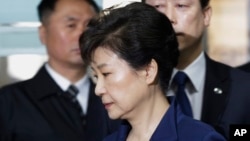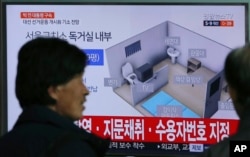Reaction in South Korea to the arrest of impeached President Park Geun-hye has been relatively restrained as the nation focuses on the upcoming presidential election.
The country’s first democratically elected president to be ousted from office was sent to jail early Friday morning after a South Korean court approved a prosecutor’s arrest warrant on charges of bribery, extortion and abuse of power.
The criminal charges against Park are linked to the political scandal that forced her from office, allegedly colluding with her long time friend Choi Soon-sil to extort Korean conglomerates to donate more than $69 million to two dubious foundations.
For months, Park’s impeachment drama sharply divided the South Korean public with her opponents holding massive rallies to demand her impeachment or resignation, and with supporters staging demonstrations to try to keep her in office. Two Park supporters where killed in clashes with police outside the court on the day her impeachment ruling was announced.
Conservative regret
But in Seoul Friday there were no opposition rallies celebrating Park’s arrest and no angry groups of Park supporters demanding her release.
A pro-Park rally is expected to be held this weekend, but the ex-president’s political party, the Liberty Korea Party, seems to want to distance itself from the scandal and its disgraced former leader.
Jeong Joon-gil, the spokesman for the Liberty Korea Party, released a short statement calling Park’s arrest “regrettable” and saying, “We hope such a painful history of arrest of a former president will not repeat itself in South Korea.”
An early presidential election has been scheduled for May 9.
Mood against conservatives
In the wake of the impeachment, the public mood has seemingly turned against conservatives, with many blaming Park’s hard-line polices for increasing tensions with North Korea over its weapons program and with China, which is angry about South Korea’s decision to host a U.S. anti-missile system.
The Liberty Korea Party has been struggling to find a strong candidate for president. The leading contender of the conservative camp is South Gyeongsang Province Governor Hong Joon-pyo, but his approval rating is 4 percent in a recent Gallup opinion poll.
The conservative Bareun Party that broke away from the Liberty Korea Party released a statement saying it respects the court’s decision but questioned whether Park’s arrest was necessary in terms of healing national divisions caused by the scandal.
The Bareun candidate for president, Yoo Seung Min, is registering at 2 percent approval in the Gallup poll.
Liberal victory
The liberal Democratic Party of Korea, which hailed Park’s impeachment as a triumph of democracy, called her arrest a victory for the rule of law.
“Considering the fairness of law and principles (entailed,) the arrest of former President Park is an obvious conclusion,” said Park Kyung-mi, the spokesperson for the Democratic Party of Korea.
Democratic Party candidate Moon Jae-in is the leading contender for president with a Gallup poll approval rating of 31 percent.
Ahn Cheol-soo, the leading candidate for the more centrist People’s Party, who is second in the Gallup poll at 19 percent, said in a statement that Park’s arrest, “is of her own making because she repeatedly gave false explanations without expressing apologies or regrets.”
Prison time
While Park has maintained her innocence, she had refused to publicly address the specific allegations against her. After remaining silent during the impeachment process, Park recently agreed to cooperate with the criminal investigation and was interrogated by prosecutors for 14 hours.
Park can be held in prison for up to 20 days while being investigated, at which time she must be formally charged or released. Although Park’s defense team argues she posed no risk of fleeing the country, the Seoul Central District Court judge overseeing the case ordered her arrest seemingly out of concern that she might destroy evidence.
Park could face more than 10 years in jail if convicted of receiving bribes from bosses of big conglomerates, including Samsung Group chief Jay Y. Lee, in return for favors. Lee, who denies charges that he provided bribes in return for favors for Samsung, and Choi are both in detention and on trial separately.
Lee’s trial, for which so far only preliminary hearings have been held, will begin April 7 when he is expected to appear, court records showed.
Park may be given a bigger cell than other inmates in a Seoul detention facility, but she would be subject to the same rules on everything from meals to room inspections, former prosecution and correctional officials have said.
Youmi Kim contributed to this report.










